- Home
- Laurence Yep
The Tiger's Apprentice
The Tiger's Apprentice Read online
Dedication
To Jesse, a wizard with a soccer ball
Contents
Cover
Title Page
Dedication
Prologue
Chapter 1
Chapter 2
Chapter 3
Chapter 4
Chapter 5
Chapter 6
Chapter 7
Chapter 8
Chapter 9
Chapter 10
Chapter 11
Chapter 12
Chapter 13
Chapter 14
Afterword
Excerpt from Dragonwings
About the Author
Books by Laurence Yep
Copyright
About the Publisher
Prologue
Every hair on Mr. Hu’s mustache and goatee began to quiver as he was about to enter his antique shop, and he always trusted his whiskers whenever they warned him of trouble ahead. So he pretended to fumble for his key while he prepared the spell that would change him into his warrior shape, stopping just short of the final word of the incantation. That way, once he finally said it, he would complete the transformation in the blink of an eye. Feeling he was ready now for any unpleasant surprises, he unlocked the front door and went inside.
The postman had stuffed his mail through the door’s letter slot, and while he squatted to pick it up, his keen eyes darted around the front room but he did not see any ambushers, and the only scent his nose detected was the usual smell of dust.
Setting his correspondence aside, he moved as quietly as if he were back in his clan’s jungle, making his way through the furniture, urns, and curios to the apartment at the rear and finding it also empty of intruders. But the small vault stood open and its glittering, costly contents lay scattered on the floor like trash.
These were no common thieves who had circumvented his store’s security system and his magical wards, but why did they leave behind valuables that would have fetched high prices?
As he was pondering this, the glare of light from a computer screen caught his eye. He was appalled to see that the thieves had opened a database of his customers with their addresses and past purchases. Had the burglars been seeking their next victims?
Curbing his anger, he picked up each ring, necklace, and brooch from the floor and compared it to the computer’s inventory spreadsheet before returning it to the vault. After a fifteen-minutes of methodically checking, he found that he was missing a Fabergé egg that had been made for a Russian tsar. Crafted with gold and enamel, Fabergé’s work of art was worth millions but so was the diamond encrusted tiara lying near his shoe. What was so special about the Fabergé egg that made it more desirable than the tiara?
Also stolen was a small jade carving of an egg-like mountain. Made in Occupied Japan, at most it was worth fifteen hundred dollars, a tiny fraction of the Fabergé’s value. The only thing the two had in common was their shape.
But that fact made his whiskers bristle as if he had just been struck by lightning.
No, no, no! he thought. They couldn’t be looking for that here, could they?
Hoping to disprove the horrible possibility, he broadened his search for more egg-themed objects and found that a framed Victorian silhouette of Humpty Dumpty was gone from the front room as well as a beechwood darning egg from the 1950s. It would take him days to determine the extent of his losses, but he was convinced that anything else stolen would also resemble an egg in some way.
Besides selling regular antiques, the store also dealt in extremely rare magical objects. Had the thieves hoped that in their odd combination of loot they would find the greatest treasure of all, something incredibly ancient, something that could control the entire world’s destiny? For millennia, humans and monsters had been searching for it in China. It was bad news that the hunt had now shifted overseas to places like San Francisco.
Even worse, the name of his former teacher, Mrs. Lee, was on the customer list the thieves had examined. He cursed himself for not deleting all records linking her to the store. She had regularly bought enchanted items from his uncle, the former owner, and even though none of them were what the thieves were seeking, they might break into her house to see what else she had in her collection.
Since inheriting his uncle’s shop and returning to the city, Mr. Hu had been reluctant to visit her. Mrs. Lee had been a surrogate mother as well as mentor and she had not wanted him to leave to fight in his clan’s war. She had insisted that his apprenticeship to her outweighed any obligation of blood, but to her great disappointment, Mr. Hu had argued that his honor demanded he go. As a result, they had not parted on the best of terms.
He hoped his fears were misplaced. She had protected her home with such potent magic that thieves would find it hard to disturb her, but even so, he ought to tell her to be alert.
He tried to call her now, simultaneously feeling anxious and yet looking forward to hearing her dry voice again, but her regular telephone was busy, and the customer list had no cell phone number for her.
So a half hour later, after returning everything to the vault and setting even more powerful protective wards, he tried again but still got a busy signal. He decided then that she must be using her telephone line to connect a computer to the internet.
He would need to warn her in person.
Chapter 1
It isn’t every day you meet a tiger. And certainly not a tiger in a suit and tie. And definitely not one who knows your first name.
The tiger was the last thing Tom Lee expected as he stumbled up the steps to his grandmother’s home.
It was a grand old house in the Inner Richmond of San Francisco. Gingerbread shingles covered its sides like scales, and pigeons cooed under its ornate window eaves. It seemed to have cast some magical spell that protected it and its neighbors from being replaced by the cheap, ugly apartment houses that had swallowed up the rest of the city.
However, today, Tom didn’t want to admire it. As he hurried up the steps, he just wanted to hide inside—away from all the people staring at the big bruise surrounding one eye and the torn sleeve of his blue shirt.
At the park Jack, an eighth-grader, had called Tom’s grandmother a weirdo—which everyone in the neighborhood did because of the way she decorated her house. It was full of magical charms—strange designs on paper, wood, and stone, and words written in a ghostly script. Hanging everywhere were mirrors with trigrams—sets of three lines, either solid or with a gap in the middle—from an ancient book called the Book of Changes. They made up patterns that could tell the future and had magical powers. And incense was always burning before bizarre statues.
When she walked down the street to do her shopping, their non-Chinese neighbors turned and whispered to one another. The Chinese in the area treated her as if she were invisible, and the Chinese shopkeepers were afraid to say a word to her and always waited on her first, as if they were in a hurry to get her out of their shops—not that she cared. She was proud of working magic and was even teaching Tom the rudiments of what she called the Lore.
Unfortunately for Tom, the neighborhood’s attitude had filtered down to the children, who stuck Tom with the same label—weirdo. Bullies—Chinese or not—loved to pick on anyone different, and they had made Tom their favorite target.
He couldn’t ignore an insult slung at his grandmother, who had taken care of him ever since he was a baby. His archaeologist parents had disappeared somewhere in Malaysia when he was only a year old. Everyone, including Tom and his grandmother, assumed they were dead.
Even though he was small for his age and his opponents were usually much larger, he defended his grandmother almost every day, and the frequent fights had earned him
his own reputation as a troublemaker. His folder in the school counselor’s office was stamped AT RISK.
So why should today be any different than any other day? Though Jack was an eighth-grader, Tom had demanded he take back his rude words. Of course, Jack wouldn’t, and so there had been a fight. The real problem was that Jack had brought pals just as big as he was.
It would have been so much easier if Tom could have turned them into lizards, but his grandmother refused to teach him those spells until she was sure he would not misuse them. So Tom had had to use his fists. Against Jack alone, he might have stood a chance—which Jack knew and was why he had dared insult Tom’s grandmother only when he had a gang around him.
“Turning them into lizards is too good for them. Fungus, maybe,” Tom said to himself as the steps creaked under his feet. He couldn’t wait to get inside the house. It was his fort, strange as it was. Within its walls, he felt safe from the rest of the world. And maybe he’d work on her again to teach him some spells he could use for defending himself.
At the door he fumbled for his key and found he had forgotten it. So he jabbed the doorbell hard. “Please, Grandmom. Hurry up,” he muttered.
When the door opened, though, it was a stranger who greeted him. “Good afternoon, Master Thomas. Your grandmother has been telling me wonderful things about you.” The visitor took in the black eye and the torn sleeve and scratched his head. “But I see she might have been exaggerating a tad.”
The stranger looked like an elderly man with a trim, gray mustache and goatee—except for his furry ears. The stranger brushed his goatee. “Do I have something on my face? Is that why you’re staring?”
Tom’s grandmother had taught him some basic spells, and one of them was for showing the true shape of things—which she said was essential for anyone working in magic. Curious about his grandmother’s visitor, Tom chanted the words under his breath. He jumped when the next instant he saw a tiger standing there on his hind legs.
In the Chinese folktales his grandmother told him, animals could talk, but he had always thought those were just stories. He’d never expected to meet a talking animal.
“Is that you, Tom?” his grandmother called from the kitchen. “Where have you been?”
Suddenly Tom stood tongue-tied out of shame. He’d been so small when his parents had disappeared that he didn’t remember them. Whenever Tom wanted a hug or a kind word, he could always count on his grandmother, but it was her voice he loved best. There was always a smile hidden behind her words. Her voice reminded Tom of a stream chuckling as it ran over rocks. He felt guilty for ducking out of his grandmother’s lessons today, especially since he had run into Jack and his gang.
Impatiently the tiger slipped a watch from a pocket in his suit vest and consulted it. “I’d step inside unless you intend to eat on the porch. Mistress Lee, I think you’d better fetch Master Thomas if you don’t want him turning into a porch fixture.”
Tom’s grandmother came out of the kitchen wearing an apron covered with stars. Her long white hair hung down her back in a heavy, braided rope. “Oh, my.” His grandmother took Tom’s arm and the tiger’s paw. “You boys come inside this instant.” Gently but firmly she pulled them into her house.
Once the door was shut, she rapped Tom on his forehead. “Why did you undo his disguise? What did I tell you about doing magic on impulse?”
Rubbing the sore spot, Tom began mechanically, “A moment’s impulse leads—”
“—To a lifetime of regret,” the tiger finished, and laughed, showing sharp fangs. “That was one of the first things your grandmother taught me as well, Master Thomas.”
Standing on tiptoe, Mrs. Lee rapped the tiger on his forehead in turn. “I just wish you’d paid as much attention to your lessons on maintaining a spell. Look at you. It’s a disgrace to let a beginner undo your transformation.”
The tiger murmured a few words, and the next moment fur and fangs had disappeared and he was human again, including, this time, two very pink, embarrassed ears. “Am I more presentable now, Mistress Lee?”
“Tom, I’d like you to meet Mr. Hu, a former student of mine,” she said, and smiled affectionately when she saw the tiger adjusting his orange-and-black-striped tie before the hallway mirror. “He’s still quite the dandy.”
Mr. Hu lowered his hands sheepishly. “You were the one who taught me to be careful of my appearance. Before you, I didn’t care how tangled my fur was.”
“And I never saw anyone take so to his lessons.” Tom’s grandmother laughed. “Some people might even think you were vain.”
“Pleased to meet you,” Tom said to the tiger politely.
His grandmother fingered Tom’s torn sleeve and then noticed the yellow-and-blue circle around his eye. “Oh, dear, did you get into another fight?”
“They started it,” Tom protested.
“Did you finish it?” Mr. Hu asked.
“No,” Tom admitted.
Mr. Hu looked disappointed, but before he could make a comment, Mrs. Lee frowned disapprovingly at her visitor. “Hu!” And then she turned back to her grandson. “Tom, what have I always told you?”
“Violence—” Tom began.
“—Doesn’t solve anything,” Mr. Hu finished for the boy again. It was apparently another lesson that had been driven into his memory. “But I would be more concerned with the ‘they.’ You ought to show more sense about fighting battles when the odds are against you. That’s simple mathematics.”
Tom glanced at his grandmother accusingly. “It wouldn’t matter if Grandmom would teach me some magic to defend myself.”
“The Lore isn’t for hurting people—no matter what the provocation.” His grandmother frowned. “You have to learn the philosophy first.”
“It’s boring,” Tom admitted.
“And so you got into trouble instead,” his grandmother scolded him gently. “You shouldn’t have snuck away from our lessons.”
“I hated the theory too,” Mr. Hu sympathized.
“Don’t encourage him in his delinquency.” Mrs. Lee wagged a finger at the tiger and then, unfortunately, turned her attention back to her grandson. “What was the fight about?”
“Nothing,” Tom mumbled.
“You don’t get a black eye over ‘nothing.’” His grandmother stared at him hard until Tom began to squirm. It seemed to him sometimes that his grandmother threw some silent magic into those stares, but he could never be sure.
Tom looked down at his feet. “They said you were weird,” he muttered.
His grandmother sucked in her breath slowly, as if the air hurt her lungs. “That’s what children call anyone who’s different,” she said.
Mr. Hu eyed Tom critically and then grunted, “Don’t worry, Master Thomas. These bullies are nothing compared to you. Forget them. You have a gift that the whole world will soon need.”
“I do?” Tom asked, puzzled.
“Yes, and one that your grandmother will teach you to open,” Mr. Hu said.
Tom’s grandmother brushed Tom’s hair out of his eyes with a hand that smelled very faintly of flour. “I just hope you pay more attention to your lessons than Mr. Hu did.” She straightened the tiger’s collar, then she began to straighten her grandson’s clothes.
“Master Thomas is not a little doll,” Mr. Hu said with a cough.
Mrs. Lee glanced sideways at the tiger. “Do I amuse you?”
Mr. Hu bowed quickly. “I mean no disrespect. I’ve just . . . never seen this side of you before.”
Tom’s grandmother made one last adjustment to Tom’s clothing and then stepped back. “I was always so busy when my son was Tom’s age; but by the time I realized that, Paul had already grown up. I’m not going to make the same mistakes now.”
His grandmother looked so sad that Tom asked, “What mistakes, Grandmom?”
“Too many to mention,” she said, tugging him down the worn boards of the hallway into the living room. The room had a high ceiling and elaborate molding that
framed the doorways and windows and bookcases. But it was hard to see because of his grandmother’s strange collections, including several odd swords hanging on the wall. The swords were made by stringing red cord through the center of old circular Chinese coins called cash. On one shelf was the prize of all her possessions—a coral rose that seemed identical to many sold in Chinatown souvenir stores; but his grandmother acted as if it were her most important thing in the world.
She gave Tom a gentle push toward the sofa. “Now you two boys get acquainted while I finish getting the tea ready.”
Mr. Hu occupied the most comfortable chair, while Tom sat on the sofa as far away from him as he could get.
The tiger lifted a derby hat from the chair’s seat and set it on a table. “I understand you’re in the seventh grade, Master Thomas.”
“Yes, sir,” Tom said politely, even though what he really wanted to ask was what the tiger was doing here.
“Are you enjoying the summer?” Mr. Hu asked as he sat down. Tom’s grandmother had only been making a suggestion that they become “acquainted,” but the tiger seemed to take it as a command.
“Not exactly,” Tom said, motioning to his eye.
“Ah, yes.” Mr. Hu coughed. “I was always getting into fights when I was a cub too.” Turning, the stranger studied his reflection in one of the many mirrors, brushing his goatee—which looked fine to Tom but was not perfect enough for the elegant Mr. Hu. “Fortunately I won more than I lost.” He sounded a bit smug.
Tom eyed the tiger. “So you snuck out of Grandmom’s lessons too?”
His sharp-eared grandmother must have overheard him because the clinks in the kitchen stopped abruptly. “Hu!” Tom’s grandmother’s warning floated along the hallway. “Be careful what you say.”
Mr. Hu glanced nervously in her direction before saying, “Well, you’ll find the theory is essential once you get into Elementary Sympathetic Magic.”
Tom slumped on the sofa, suspecting how much more boring material he had to learn. “I wish I knew more than a few basics.”

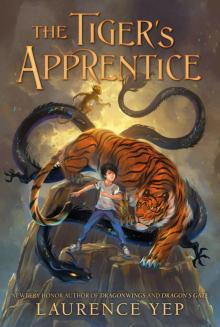 The Tiger's Apprentice
The Tiger's Apprentice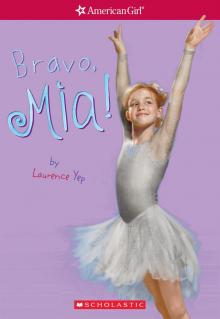 Bravo, Mia
Bravo, Mia STAR TREK: TOS #22 - Shadow Lord
STAR TREK: TOS #22 - Shadow Lord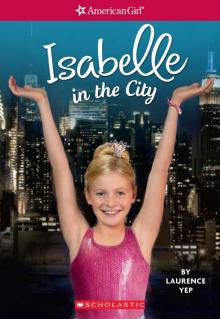 Isabelle in the City
Isabelle in the City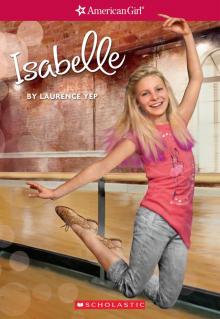 Isabelle
Isabelle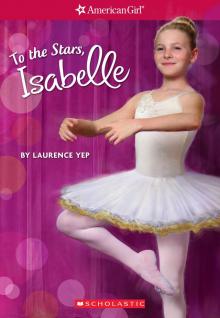 To the Stars, Isabelle
To the Stars, Isabelle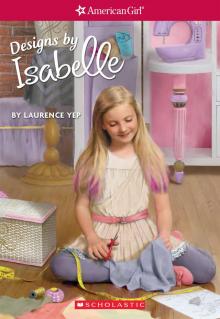 Designs by Isabelle
Designs by Isabelle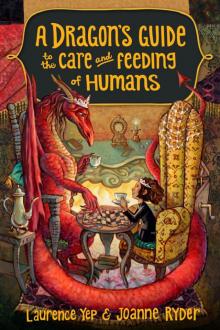 A Dragon's Guide to the Care and Feeding of Humans
A Dragon's Guide to the Care and Feeding of Humans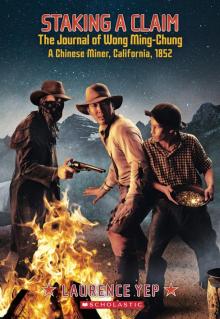 Staking a Claim
Staking a Claim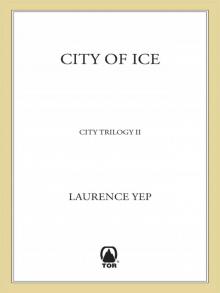 City of Ice
City of Ice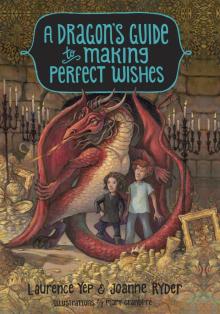 A Dragon's Guide to Making Perfect Wishes
A Dragon's Guide to Making Perfect Wishes City of Death
City of Death